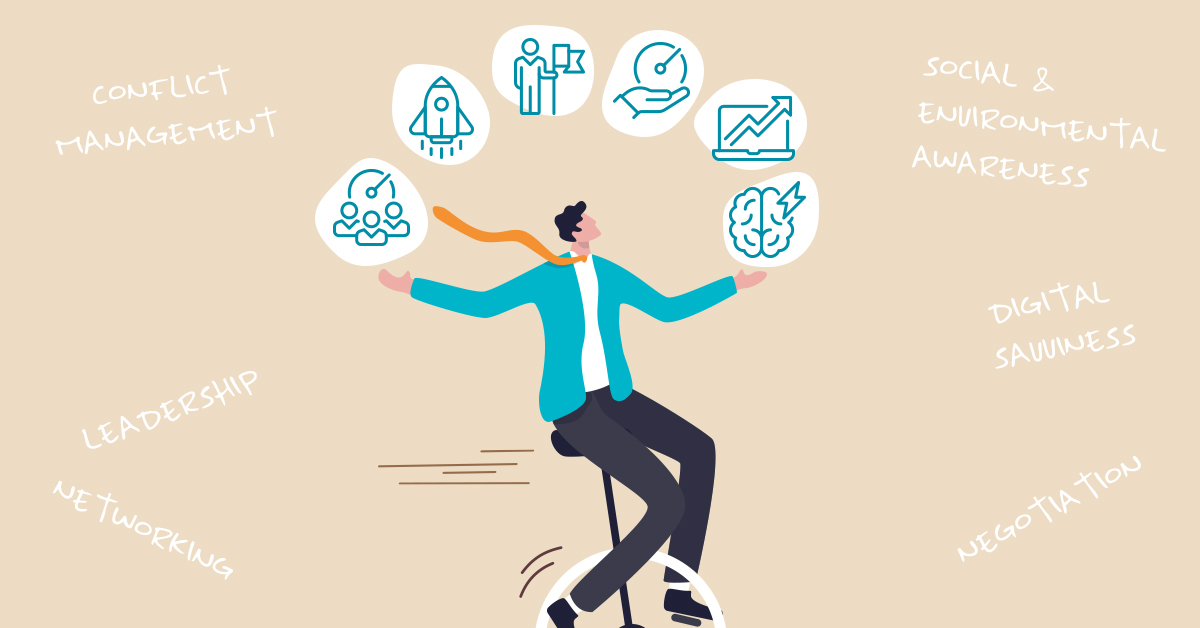The modern procurement professional must have a wide skillset. The job is no longer solely focused on cost reduction; organisations are looking to it for strategic insights and innovative solutions.
Given this expansive new territory for procurement, many skills come into play. As we go deeper into 2023 and beyond, procurement workers and employers alike are asking which skills are the most important. Over many years, we’ve guided hundreds of businesses through all phases of procurement development. We consult, perform skills gaps and provide training. This has given us a unique and holistic view of the ideal, modern-day procurement professional.
So, what do we think are the most in-demand procurement skills? Why are the important? And – most importantly – do you possess them?
The 6 most in-demand procurement skills
Negotiation
What is it?
Negotiation in procurement refers to the process of discussing and bargaining with a supplier or vendor to reach an agreement on terms and conditions for the purchase of goods or services. The negotiation process typically involves both parties making concessions and compromises in order to find a mutually acceptable agreement. It involves discussions on factors like price, quantity, delivery timelines, quality standards, and payment terms. Effective negotiation requires good communication, industry knowledge, and familiarity with procurement best practices. It can result in cost savings, improved supplier relationships, and better quality products or services.
Why is it an important skill?
Negotiation is crucial in procurement as it helps buyers to obtain better deals, build and maintain good relationships with suppliers, manage procurement risks, and enhance their reputation as skilled negotiators. Good negotiation skills can lead to cost savings, improved supplier relationships, and better outcomes for both parties.
How do I know if I’m a good negotiator?
- You consistently achieve your negotiation goals while maintaining good relationships with the other party.
- You have strong communication and active listening skills, and can effectively articulate your position and understand the other party’s perspective.
- You are confident and assertive without being aggressive or confrontational.
- You are able to creatively problem-solve and find win-win solutions that benefit both parties.
- You have a thorough understanding of the negotiation process and are able to adapt your approach to different situations.
Networking
What is it?
Networking in procurement refers to building and maintaining relationships with suppliers, stakeholders, and industry peers. It involves creating opportunities to exchange information, share insights, and establish trust, which can lead to better procurement outcomes, access to new markets, a clearer picture of new innovations and potential cost savings.
Why is it an important skill?
Networking is important in procurement because it can help build and maintain relationships with suppliers, stakeholders, and industry peers. This can lead to better procurement outcomes, access to new markets, and potential cost savings, as well as providing plenty of opportunity to promote yourself and your organisation. It also allows procurement professionals to stay current with industry trends and best practices.
How do I know if I’m a skilled networker?
- You are able to establish and maintain genuine relationships with a diverse range of people, including suppliers, stakeholders, and industry peers.
- You actively seek out opportunities to connect and collaborate with others in your industry.
- You are a good listener and ask thoughtful questions, which helps you to understand the needs and perspectives of others.
- You are able to share information and insights in a way that is helpful and relevant to others, without expecting anything in return.
- You follow up and stay in touch with your contacts, even after your immediate needs have been met.
Leadership
What is it?
Leadership in procurement refers to the ability to inspire, influence, and guide a team of procurement professionals or a cross-functional team towards achieving the organisation’s procurement goals. It involves developing and implementing procurement strategies, managing procurement processes and building strong relationships with suppliers and stakeholders to deliver value to the organisation.
Why is it an important skill?
Leadership is essential in procurement because procurement often involves leading projects, stakeholders, and suppliers to an outcome. Whether sourcing goods or services, managing contracts, or building relationships, a procurement professional with strong leadership skills can effectively manage the procurement processes, develop strategies, and align them with the organisation’s goals. As a result, good leadership can drive procurement performance, enhance collaboration, and deliver organisational value. Without leadership skills, a procurement professional may struggle to develop a cohesive strategy that aligns with the organisation’s goals and build strong relationships with suppliers and stakeholders.
How do I know if I’m a good leader?
- You have strong results orientation, being able to deliver procurement outcomes, such as savings, and risk mitigation.
- You are able to manage procurement processes effectively, including sourcing, contract negotiation, and supplier management, and continuously look for opportunities to improve.
- You have a clear vision and strategy for your procurement project that aligns with the organisation’s goals and values.
- You are able to effectively communicate this vision and strategy to your team and stakeholders, and inspire them to work towards achieving it.
- You lead from the front, building and maintaining strong relationships with suppliers and stakeholders.
- You are able to attract, develop, and retain top talent, and create a culture of collaboration, innovation, and continuous improvement within your team.
Conflict management
What is it?
Conflict management in procurement refers to the process of identifying, addressing, and resolving disputes or disagreements that arise during procurement activities. It involves understanding the root causes of the conflict, communicating effectively with the parties involved, and finding a mutually agreeable solution that meets the needs of all stakeholders.
Why is it an important procurement skill?
Conflict management is an important skill in procurement. Why? Because disagreements and disputes are inevitable in procurement.. Effective conflict management can help to minimise disruptions, maintain positive relationships with suppliers and stakeholders and avoid costly litigation. It can also lead to better procurement outcomes and enhance the reputation of the procurement function in general and you in particular.
How do I know if I’m good at it?
- You are able to remain calm and objective in the face of disagreements or disputes.
- You actively listen to all parties involved and strive to understand their perspectives.
- You can identify the root causes of the conflict and propose creative solutions that meet the needs of all stakeholders.
- You are able to communicate effectively and maintain positive relationships with suppliers and stakeholders, even in challenging situations.
- You are able to prevent conflicts from escalating by addressing issues early and proactively.
Social & environmental awareness
What is it?
In procurement, this involves taking into account the social and environmental impact of procurement decisions. It involves ensuring that procurement activities are ethical, sustainable, and socially responsible, and holding suppliers accountable for their practices. This approach aligns with principles of sustainability and corporate social responsibility, and can help organisations achieve their social and environmental goals.
Why is it an important skill?
Because it supports sustainability and corporate social responsibility principles. It helps mitigate risks related to negative impacts of procurement activities, enhances the organisation’s reputation (in the eyes of both consumers and stakeholders) and supports sustainable supply chains. It can also drive innovation in sustainable products and services, creating long-term value.
How do I know if I’m good at it?
- You actively seek to understand the social and environmental impact of procurement decisions and take steps to minimise any negative effects.
- You incorporate sustainability and social responsibility considerations into procurement processes and supplier selection criteria.
- You regularly communicate with suppliers and stakeholders about the organisation’s expectations and requirements for social and environmental practices.
- You continuously look for opportunities to improve the organisation’s social and environmental performance through procurement activities.
- You monitor and report on social and environmental performance indicators, and use this information to drive continuous improvement.
Digital savviness
What is it?
Digital savviness in procurement refers to the ability to effectively use digital technologies and tools to optimise procurement processes, improve efficiency, and drive innovation. It involves leveraging digital platforms and emerging technologies such as AI, machine learning and blockchain to improve procurement outcomes and decision-making.
Why is it an important procurement skill?
It enables professionals to work more efficiently, reduce costs, and improve procurement outcomes. It allows them to navigate the changing landscape of digital procurement, adopt new tools and technologies, and drive innovation. It also helps them manage data-driven decision-making processes and analyse complex data sets. Modern data analytics can cleanse and categorise enormous amounts of data in brilliantly effective ways, but at some point the human mind must take over in order to glean strategic insights.
How do I know if I’m good at it?
- You have a good understanding of digital procurement tools and technologies, and keep yourself up-to-date with the latest developments in the field.
- You are able to identify opportunities to use digital technologies to optimise procurement processes and achieve better outcomes.
- You are able to work with data and use data analysis tools to gain insights into procurement performance and identify areas for improvement.
- You are comfortable with using digital communication tools to collaborate with colleagues, suppliers, and other stakeholders.
- You are able to manage procurement-related data and information effectively and ensure that it is stored securely.
How Lacking These Six Skills Can Turn You into a Toothless Tiger
Removing any of the six skills from a procurement professional would weaken their ability to perform their job effectively. For instance, a procurement professional without negotiation skills may struggle to achieve favourable contract terms with suppliers. Similarly, a procurement professional without networking skills may miss valuable connections, information and innovations. Without leadership skills, a procurement professional may struggle to develop a cohesive strategy that aligns with the organisation’s goals. If conflict management skills are lacking, disputes and disagreements may escalate, harming relationships with suppliers and stakeholders. A procurement professional without digital savviness may struggle to utilise technology effectively in procurement activities such as sourcing, contracting, and supplier management or may be unable to interpret data effectively. Finally, without social and environmental awareness skills, misaligning your procurement activities with the organisation’s values could lead to reputation damage for the organisation and negative consequences for society and the environment.
Which procurement skills do you need to develop?
There’s a lot of ground for procurement professionals to be across. This is one reason why there’s such a dearth of skilled procurement professionals available right now. But that’s the opportunity.
If you asked yourself the questions above and found yourself possibly lacking in certain areas, we can help. Comprara can not only identify the gaps, but help you close them with industry-leading modules and training programs. Get in touch now and become indispensable to your organisation.








